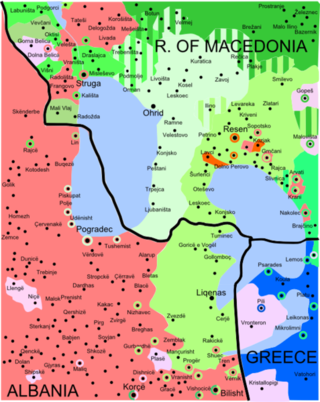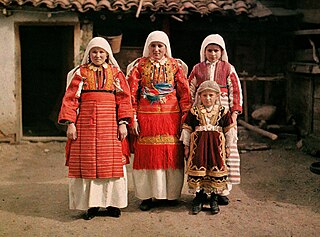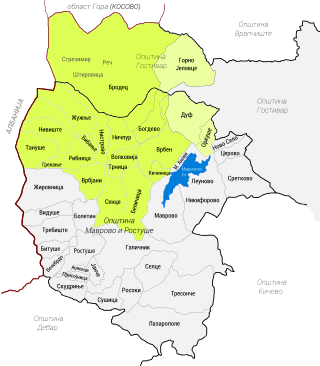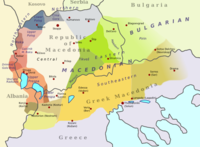
Macedonian is an Eastern South Slavic language. It is part of the Indo-European language family, and is one of the Slavic languages, which are part of a larger Balto-Slavic branch. Spoken as a first language by around two million people, it serves as the official language of North Macedonia. Most speakers can be found in the country and its diaspora, with a smaller number of speakers throughout the transnational region of Macedonia. Macedonian is also a recognized minority language in parts of Albania, Bosnia and Herzegovina, Romania, and Serbia and it is spoken by emigrant communities predominantly in Australia, Canada and the United States.

Vardar Macedonia was the name given to the territory of the Kingdom of Serbia (1912–1918) and Kingdom of Yugoslavia (1918–1941) roughly corresponding to today's North Macedonia. It covers the northwestern part of geographical Macedonia, whose modern borders came to be defined by the mid-19th century.

The Macedonians in Albania are an officially recognized ethnic minority. According to the 2011 census, 5,512 ethnic Macedonians live in Albania. In the 1989 census, 4,697 people had declared themselves Macedonian.
The dialects of Macedonian comprise the Slavic dialects spoken in the Republic of North Macedonia as well as some varieties spoken in the wider geographic region of Macedonia. They are part of the dialect continuum of South Slavic languages that joins Macedonian with Bulgarian to the east and Torlakian to the north into the group of the Eastern South Slavic languages. The precise delimitation between these languages is fleeting and controversial.

The Struga Dialect is a member of the western and north western subgroup of the western group of dialects of Macedonian. The dialect is spoken in Struga, Pogradec, Pustec, and up to the Golo Brdo and in the surrounding hinterland. The dialect has many similarities with the Vevčani-Radožda, Ohrid and Korča dialects.

The Lower Prespa dialect, is a member of the western subgroup of the western group of dialects of Macedonian. This dialect is mainly spoken on the Eastern shore of Prespa Lake and Small Prespa Lake, both in North Macedonia and by the Slavic-speaking community on the Greek side of the border. The Prespa dialect spoken in the Greek community has elements of Greek such as "d/δ". This area is mainly composed of villages, such as Brajčino, Dupeni, Štrbovo, Ljubojno, western parts of the Florina regional unit and northern parts of the Kastoria regional unit. The Lower Prespa dialect is very similar to the Upper Prespa dialect and Ohrid dialect.

The Galičnik dialect or Small Reka dialect is a member of the subgroup of western and north western dialects of the western group of dialects of Macedonian. The dialect is spoken on small territory on the mountain Bistra in western part of the Republic of Macedonia. The name of the dialect is derived by the biggest village in that area- Galičnik. Also the dialect is spoken in many other small villages including the village Gari. The Galičnik dialect is closely related with the Reka dialect which is spoken north-western of Galičnik dialect. This dialect is well known in Republic of Macedonia because of the archaic words that this dialect has. The dialect can be found in many historically important literary works for the Macedonian literature. One of the most important is Ǵorǵija Puleski and his dictionary of three languages.

The Ohrid dialect is a member of the western and north western subgroup of the western group of dialects of the Macedonian language. The dialect is spoken in the region around the city Ohrid, North Macedonia up to the southern point of the Ohrid Lake. Except in the city of Ohrid, the dialect is spoken in the villages Trpejca, Peštani, Elešec, Velgoshti and many others smaller villages in that area. This dialect is known among the Macedonians as a dialect of extensive use of the suffix -t and to some extent shortening of the words. The Ohrid dialect is also part of the Macedonian literature, especially with the works of Grigor Prličev with his Biography, Skenderbeg and Serdarot. The Ohrid dialect is closely related with the nearby city Struga and Upper Prespa dialects.

Ethnic Bulgarians in present-day Albania live mostly in the areas of Mala Prespa, Gollobordë and Gora. According to the Bulgarian State Agency for Bulgarians Abroad, 40,000 to 50,000 persons of Bulgarian origin are living in Albania. Ethnic identity can be fluid among the Albania's Slavophonic population, who might identify as Albanian, Bulgarian or Macedonian, depending on the circumstances. Between 2001 and 2016, around 4,470 Albanian nationals applied for a Bulgarian citizenship and over 2,600 of them were granted one. The Bulgarian minority was recognized by the Albanian government in October 2017.

The Gostivar dialect or Upper Polog dialect is a member of the western and north western subgroup of the western group of dialects of Macedonian. The dialect is mainly spoken in the area around the city of Gostivar to the villages Brvenica and Bogovinje on north, Reka region on west, Poreče on east and Galičnik on south. The dialect is closely related with the neighbouring dialects, particularly with the Kičevo-Poreče dialect, Reka dialect and Galičnik dialect. Also in some extent, the dialect shares some similarities with the Tetovo dialect. The dialect is very well known for using masculine forms of direct and indirect objects, for male and female.
Trebisht is a former municipality in the Dibër County, eastern Albania. At the 2015 local government reform it became a subdivision of the municipality Bulqizë. The population at the 2011 census was 993.

The Upper Prespa dialect is a member of the western subgroup of the western group of dialects of Macedonian. The dialect is spoken in the town of Resen and surrounding areas. The Upper Prespa dialect is very similar to the Lower Prespa dialect and the Ohrid dialect.

The Reka dialect is a member of the west and north-west subgroup of the western group of dialects of Macedonian. The dialect is mainly spoken on the territory of the region Reka in the north-western part of North Macedonia. The Reka dialect is very close with the Galičnik and the Debar dialects. This dialect contains a lot of archaic words.

Pustec formerly known as Liqenas (1973–2013), is a village in Pustec Municipality, Korçë County, eastern Albania. Situated on the southwestern shore of Lake Prespa, it is home to much of the Macedonian minority in Albania.

Mala Prespa is a term used to denote a geographical area in eastern Albania, part of the wider region of Prespa. It is located on the western shore of Lake Prespa along the southeastern edge of Albania within the wider Korçë County and bordering the Pogradec and Devoll municipalities. The area is synonymous with Pustec Municipality.

Gollobordë refers to a geographical area of traditionally 24 villages of which 18 are situated primarily in eastern Albania, with a small portion consisting of six villages lying within North Macedonia. This region is located within the Dibër and Elbasan counties which contain both Macedonian and Albanian villages.

Macedonian national costumes are part of the material culture of the Macedonian people and they are an important branch of the Macedonian folk art.
Reka is a geographical region in Macedonia, which encompasses a quadrangle with Albania in the west, the town of Debar and the Mavrovo mountain, and Kičevo in North Macedonia in the east. The region is home to a demographically mixed population of Mijaks and Albanians. The sub-regions of Reka are Mala (Small), Dolna (Lower) and Golema (Large) or Gorna (Upper). The name Reka is Slavic in origin meaning "river".

The Upper Reka Albanian dialect is a member of the wider northern Albanian Gheg dialect subgroup of the Albanian language spoken by northern Albanians. Speakers of the dialect are mainly located within the territory of the sub-region of Upper Reka in north-western North Macedonia. Due to the geographical isolation of the Upper Reka region, the Upper Reka dialect also developed linguistic peculiarities that differentiate it from other varieties of Albanian. Within the Gheg dialects, the Upper Reka dialect is classified as a Central Gheg dialect, along with the dialects of the Kruja, Mati and Dibra regions.











